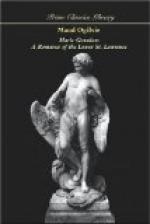Fierce indeed was the tempest without, but within the castle raged one still fiercer—that of two strong natures fighting a bitter battle. So loud were their voices raised in altercation that the storm without was scarce heeded.
Dunmorton was a fine old castle of the Norman type, with a large moat surrounding it, and having all the characteristics appertaining to the feudal state. To the rear of the moat, behind the castle, stretched broad lands, on which were scattered many cottages, whose occupants had paid feu-duty to the Lords of Dunmorton for many a generation. To the left of these cottages stretched a large pinewood, with thickly grown underbrush, where, in blissful ignorance of their coming fate, luxuriated golden pheasants and many a fat brace of partridge. That night, the depths of the pine forest were shaken, for the storm was worse than usual even for the east coast of Scotland, where storms are so frequent.
Crossing the drawbridge, and coming to the low Norman arched doorway, one entered at once into the hall. This was a lofty room some twelve feet wide. At one end of it was a broad fire-place, where huge resinous pine logs sent up an odor most grateful to the senses and emitted a pleasant, fitful blaze, lighting up, ever and anon, the faces of The McAllister and his second son Ivan.
On the walls hung huge antlers and heads of deer, the trophies of many a hard day’s sport, for they had been a race of sportsmen for generations, these McAllisters, a hardy, strong, self-reliant people, like their own harsh mountain breezes.
The two representatives of the race now quarrelling in the hall were both fine looking men, though of somewhat different types. The McAllister was a tall old man over six feet in height, well and strongly built. His hair was iron-grey, his eyes blue and piercing, his nose rather inclined to the Roman type, his mouth large and determined, and his chin firm, square and somewhat obstinate. His eyebrows were very thick and bushy, thus lending to his face a sinister and rather forbidding expression. He wore a rough home-spun shooting suit, and had folded round his shoulders a tartan of the McAllister plaid, which from time to time he pushed from him with a hasty impatient gesture, as he addressed his son in angry, menacing tones,—
“An’ I tell ye, Ivan, though ye be my son, never mair shall I call ye so, if ye join the rabble that young scamp has got together, and never mair shall ye darken the doors of Dunmorton if ye gae wi’ him. Noo choose between that young pretender and your ain people.”
“Father,” said Ivan, “he is not a pretender, of that I am convinced, and you will be soon. He is the descendant of our own King James VI. (whose mother was bonnie Queen Mary), and you paid fealty at Holyrood many years ago to King James. My bonnie Prince Chairlie should by rights be sitting on the throne of Scotland, aye, and of England too, and, by the help of Heaven and our guid Scotch laddies, he will be there ere long.”




